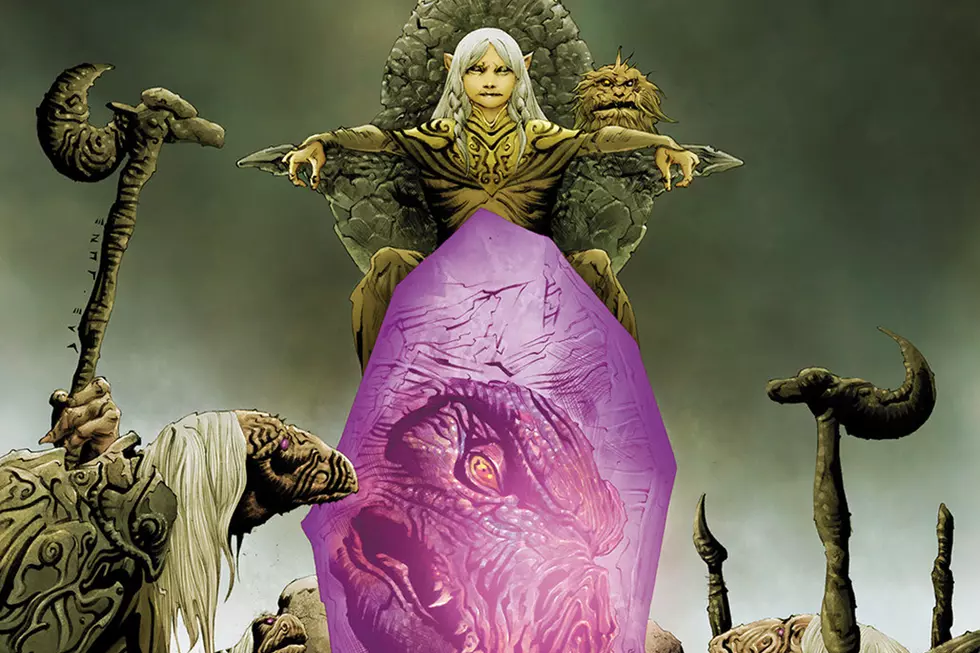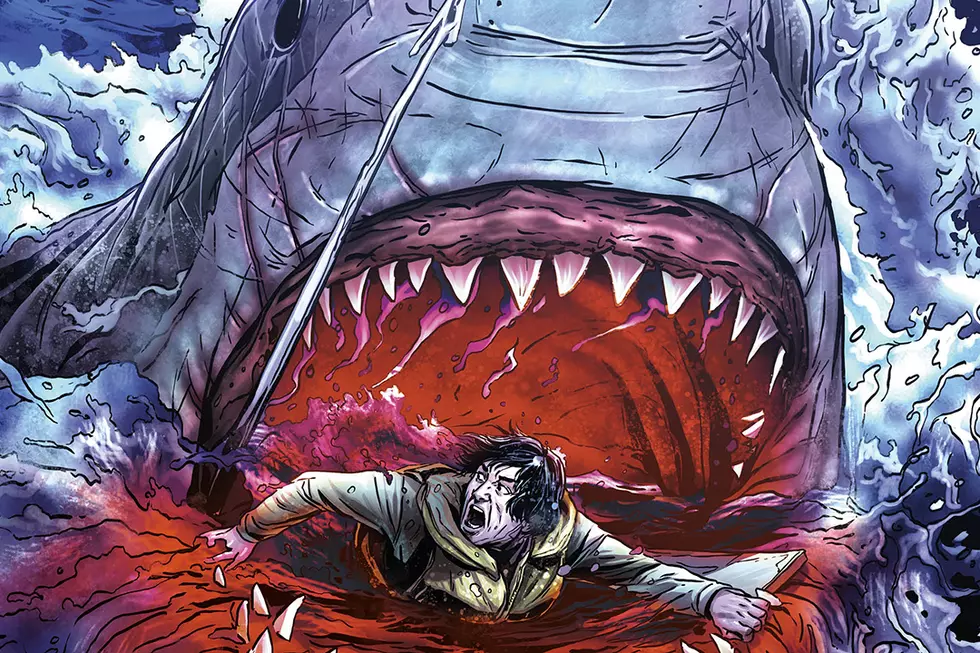![Si Spurrier and Jonas Goonface Promise A God For (Almost) Every Human in ‘Godshaper’ [Interview]](http://townsquare.media/site/622/files/2017/01/BOOM_Godshaper_PREVIEW_002.jpg?w=630&h=387&zc=1&s=0&a=t&q=89&w=980&q=75)
Si Spurrier and Jonas Goonface Promise A God For (Almost) Every Human in ‘Godshaper’ [Interview]
Imagine a world where every person has their own god. Not just their own view or idea of god (that would be our world), but their own personal diety, visible and following them around and helping them exert influence over the world. Now imagine you lived in the world and didn't have a god of your own. That's the plight facing Ennay, the protagonist of Godshaper, a new ongoing comic written by Si Spurrier with art by Jonas Goonface.
Ennay isn't just a man with no god. He has powers over the gods of others. He's also found a friend, in a small god with no accompanying human named Bud. But gods aren't supposed to exist without their humans, so what's Bud's deal? That's only one part of the story that Godshaper will be telling. As part of our exclusive reveal of this exciting project, we had a chat with Spurrier and Goonface about what makes a god, what makes a world, and what it means to have a world with so many gods running loose in it.
ComicsAlliance: I'm always curious about world-building and story. Did you start with "everyone has their own god" and arrive at the plot, or was it plot-first and then a realization about setting?
SS: Honestly, they evolved together. Every decision on the macro affects the micro and vice versa. I now couldn't genuinely say for sure whether my first idea-kernel was "two outcast-rascals who complete each other" or "a weird world where gods have replaced all technology and money."
Somewhere early on the two impulses sunk hooks into each other and just became a single organism, greater than the sum of its parts.
For instance, as a result of the "itinerant hobo buddies" story element there arose the world-building concept of Shapers: these poor nomadic people who are hated for what they are, but who provide a strange service wherever they go. Always needed, never wanted --- that's great drama. Likewise, as a result of the totally unique world we were imagining, where every living person has a personal and private god of their own, the exact nature of our two heroes' relationship gets quickly defined: one is a man without a god, the other is a god without a man. It's beautifully self-fulfilling.
We're left with, I think, a feels-packed story about friendship, heroism and happiness, set amidst literally the most peculiar-but-functional alternate world ever. Faith, love, parenthood, consumerism, terror, joy, responsibility: it's all in there, but packed deep inside a really big heart.
CA: The look of the gods in the art we've seen is really unique. They're a bit like ghosts, but more solid and less spooky. Was that aspect something you collaborated on, or was it Jonas's inspiration?
SS: Almost entirely Jonas's aesthetic, and good grief it works a charm. There's something so fundamentally comics-y about that juxtaposition, I think: the warts-and-all detail of the Normal versus the simple, bold, even cartoonish vibe of the Supernatural.
Among their many functions in this odd world, the gods serve as important status symbols --- a person shows off their fashion sense and wealth based on the appearance and size of their god. I think the only thing I specified in the script was that they should therefore come in all shapes and sizes. Jonas just took that cue and ran and ran and ran with it. This guy is amaaazing.
JG: Character design sometimes feels like leading the witness during a criminal sketch. Si had a bunch of outrageous ideas for how the gods work and look and I've been grinding away just trying to keep up with him. I'm not sure that either of us had a solid vision of the "gods" but I kept trading pictures and he'd trade back descriptions until we knew we had something really good. That’s more or less the way a good collaboration goes down.
CA: If there are almost as many gods as there are people in this world, what makes them gods?
SS: I don't want to wax too lyrical about that here, since we're being so careful in the comic to regulate the surprises of this world alongside the very relatable and poignant human story at its heart.
(Pompous Spurrier aside: I'd argue the two real tricks behind World Building have nothing to do with inventing something interesting, but with, one, inventing something interesting and functional, and two, exploring it in such a way that it's entirely subservient to the story. Weirdness is easy; heuristic weirdness is narrative platinum.)
But, sure, okay, to give you a very distilled starter-for-ten: Godshaper takes place in a world where modern technology refuses to work. Combustion, electricity, refrigeration; anything which once made life easier for mankind is now mysteriously inaccessible. It's like the whole universe just chose one day to make things difficult for humanity. Why this happened is, obviously, one of the big questions lurking behind events in the story.
But a replacement has been provided. Every man, woman and child has a god of their own. A personal attendant, following them through life, doing all the stuff technology no longer can. Providing light and warmth, cooking food, fighting wars, providing transport.
Importantly, the gods are also surrogates for wealth. In order to buy something you literally pray to the god of the person selling it. The richer you are, the bigger and more powerful your god... and the more skills it has.
And when I say "skills" I'm basically saying "super powers".
So, look, I don't even have to say another word before your mind, and my mind, goes racing with all the ramifications of this. How does crime and justice work when worship equals wealth? How has American culture adjusted to a world in which the link between power and wealth has a visible (and often kaiju-scale enormous) form? What happens to your god, and to you, if you're broke? What happens to organized religion when all the big questions about metaphysics have not only been answered, but rendered-down into materialistic units to fit a sleazy consumerist society? And, yeah: why the f--- is the world like this?
We'll be exploring all of that and more, but mostly as a backdrop to the totally human and relatable story of a pair of down-on-their-luck outcasts who want nothing more than to make music and get some respect.
CA: If everyone has a god, and Ennay can shape those gods, by extension can he also shape or control people on some level?
SS: And that right there is one of the big throbbing themes at the heart of the thing.
Again, I'm avoiding disappearing up my own ass with a big thematic rant here, but it's a no-brainer that social empowerment is one of the big topics. As long as there have been human societies there have been pariah-servants. People who provide a critical service, people without whom the whole of society would collapse. The regular Joes make it their business to ensure the underclass are never able to wield the power they actually possess. It's an unconscious expression of fear: keep them downtrodden, keep them worthless, keep them hated, keep them ignorant and isolated. In fact there's a pretty good argument for all individualist/capitalist societies being built entirely on this abominable and invisible disenfranchisement of the poor. Which--
--whoops. Straying into ra-ra-revolution politics there, Spurrier. Back away, simmer down.
I say again: first and foremost this is a story about an itinerant guy and his super-powered pal. If that's all you want to take from it, it'll still be a f---ing fabulous ride. Ennay knows what he is and he has a refreshingly happy-go-lucky attitude despite the prejudice he's experienced his whole life. His biggest issue is that he hates being defined by something he's not. He has no god, fine, sure, whatever. But he's also a poet and a musician, a petty criminal, a lover who swings both ways. The last thing he wants is to get bound-up in the big shit, the social changes, the questions about the state of reality. He just wants to get to San Francisco and play a gig.
The world has other ideas.
CA: The synopsis explains why Ennay doesn't have a god, but why doesn't Bud have a human? Did he never have one, or is there a story there?
SS: The latter. :)
Short version: nobody knows. Most people, when they die their gods quickly fade away. Bud appears to be entirely unique.
This is one of those big questions Ennay's trying really hard to avoid. When he and Bud are together they can both pass as normal. They can play their music, pass unmolested, get some respect, you know? But when they're apart they're just a pair of aberrations. One dirty Nogody and one freak deity which shouldn't exist.
Sadly for Ennay, the question of what, and how, Bud is will slowly force itself into the center of both their tales.
CA: Is this a story with a planned endpoint? It certainly seems like a world you could do a lot with.
SS: Both, basically. I know where the macro tale ends --- I'm on record all over the bloody place saying that endings are the most important part of any story, and I won't start writing without having one roughly planned --- but you're right: this world is just so insanely fertile, and Ennay and Bud are so insanely likeable, that I could happily spend forever constructing arcs within the whole.
More From ComicsAlliance
![Rooting For The Shark: Si Spurrier Builds A Smarter, Scarier ‘Hook Jaw’ [Interview]](http://townsquare.media/site/622/files/2016/09/Hookjaw.png?w=980&q=75)


![Titan Revives Sharksploitation Comic ‘Hookjaw’ With Spurrier And Boyle [SDCC 2016]](http://townsquare.media/site/622/files/2016/07/Hookjaw-Featured.jpg?w=980&q=75)
![World Building: Character And Color in Stokely And Spurrier’s ‘The Spire’ [Pride Week]](http://townsquare.media/site/622/files/2016/06/PrideWeek-Spire.jpg?w=980&q=75)
![Si Spurrier and Ryan Kelly Unleash the Wolves of War for ‘Cry Havoc’ [Interview]](http://townsquare.media/site/622/files/2016/01/cryhavoc-feat1.jpg?w=980&q=75)
![Proud Stands ‘The Spire'; Here’s How Artist Jeff Stokely Built It [Interview]](http://townsquare.media/site/622/files/2015/07/ShaDesign_feat.jpg?w=980&q=75)

![Exclusive: Titan Comics Unveils ‘Best of British’ Month in May [Video]](http://townsquare.media/site/622/files/2015/02/bestofbritish.jpg?w=980&q=75)
